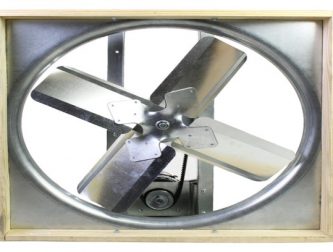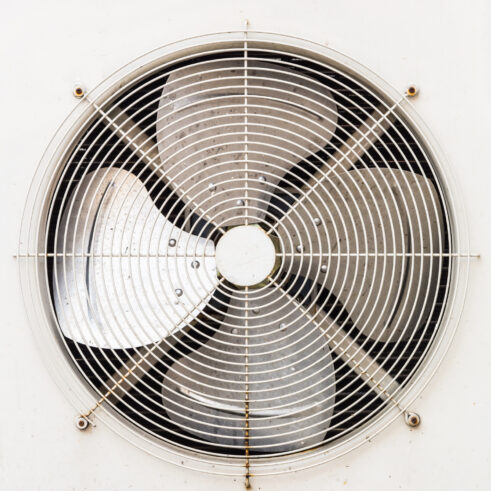Breathing in fresh and clean air is a fundamental right of every human. Even when you are indoors, having access to clean air is crucial to maintaining a healthy lifestyle. This is why exhaust fans play a vital role in most households and industries.
An exhaust fan serves the role of an air purifier. They remove the stagnant air inside a room and replace it with a steady stream of fresh outdoor air. From bathrooms to kitchens to manufacturing plants, exhaust fans are suitable for a wide range of applications.
Preservation of Interiors: High humidity levels can wreak havoc on interiors, causing paint to peel and drywall to crack. Exhaust fans maintain an optimal moisture balance, safeguarding your interiors from unsightly and potentially costly damages.
Exhaust fans can be installed in various areas of a home, each serving a specific purpose. There are also commercial exhaust fans that are suitable for industrial applications. Below, we look at the most common types of exhaust fans available in the market.
Picture a room nestled away from open spaces, beckoning for a breath of fresh air. The ceiling-mounted exhaust fan is the answer to this scenario. Designed to channel impure air through an exhaust duct, this fan necessitates the presence of a Mechanical Ventilation Heat Recovery System (MVHR) duct. This conduit is ingeniously concealed within or on the ceiling, serving as a conduit directing air out of the premises.
These ceiling-mounted marvels come in varying sizes, spanning 8, 10, and 12 inches. The appropriate size selection hinges on factors like room dimensions and the dimensions of the ventilation ducts. A symbiotic match between the fan’s size and its surroundings is paramount.
The wall exhaust fan has a much simpler installation process. The wall-mounted exhaust fan is suitable for homes graced with walls that directly face open spaces. This versatile fan boasts effectiveness in evacuating stale and dusty air from homes. Unlike its ceiling-mounted counterpart, the wall-mount exhaust fan doesn’t necessitate a Mechanical Ventilation Heat Recovery System or specialised exhaust ducts.
While an excellent fit for bedrooms and living rooms, wall exhaust fans harmonise equally well with kitchen and bathroom environments. Their sizes mirror those of their ceiling-mounted counterparts, ranging from 8 to 12 inches, requiring alignment with room dimensions and ventilation duct specifications.
This is primarily a small exhaust fan. The window exhaust fan nestles snugly within an open window frame. Variants of this round exhaust fan may include adjustable side panels, capable of extending to envelop the entire window aperture. These fans often boast multiple speed settings, granting users control over airflow intensity. Some even flaunt reversibility, enabling seamless switching between intake and outtake modes.
Advanced iterations feature thermostats that automatically halt operation upon achieving specific temperatures. Similarly, adjustable grilles cater to directing airflow precisely. Further enhancements include remote control and auto-off timers, elevating user experience. A potent window exhaust fan can be metamorphosed into a comprehensive whole-house ventilation solution for substantial air circulation.
Exuding power, the inline exhaust fan showcases formidable air-moving capabilities. Boasting the potential to transport voluminous quantities of air, these fans channel energy efficiency, consuming less power in the process. The fan’s prowess is often quantified in cubic feet per minute (CFM), denoting the volume of air it can displace in sixty seconds.
Ideal for scenarios necessitating heat and moisture dispersion, such as spacious tents or large rooms, these fans also find their place in settings like server cabinet systems and audio-visual equipment setups. Flexible duct tubes and add-ons like silencers and carbon filters form companions to these fans, enhancing their effectiveness manifold.
The kitchen is a hub of gastronomic delights. It often generates aromatic fumes and combustion byproducts during cooking escapades. The kitchen exhaust fan steps in as the culinary companion, ensuring these odours and gases are promptly channelled away.
Exhaust fans for kitchens commonly integrate filters, eradicating cooking odours as air circulates back into the room. Oil filters work with carbon or activated charcoal filters, which neutralise cooking-related fragrances. Kitchen exhaust fan install options include both wall-mounting and direct channelling through the wall. Options abound for duct-mounted or recirculated setups, with the latter requiring less intricate installation.
Chances are, you might already have a bathroom exhaust fan sourced from Bunnings installed in your home. Given the prevalent moisture and humidity levels in bathrooms, the use of exhaust fans has become a widespread norm.
Post-shower moisture accumulation on surfaces can cast a damp shadow over your bathroom. The bathroom exhaust fan comes to the rescue, effortlessly banishing excess humidity and dampness. Compact in size and budget-friendly, this mini exhaust fan makes an attractive addition to any home.
Exhaust fans are not mere appliances; they are a necessity for maintaining fresh, breathable indoor spaces. Whether mounted on ceilings, nestled in windows, or affixed to walls, the exhaust fan is a vital part of any home.
If you need any assistance installing or repairing exhaust fans for your residential or commercial needs, get in touch with us.

If you have hired or are hiring electricians before, whether for a sma

Improving the air circulation in your house can ensure that every envi
| M | T | W | T | F | S | S |
|---|---|---|---|---|---|---|
| 1 | ||||||
| 2 | 3 | 4 | 5 | 6 | 7 | 8 |
| 9 | 10 | 11 | 12 | 13 | 14 | 15 |
| 16 | 17 | 18 | 19 | 20 | 21 | 22 |
| 23 | 24 | 25 | 26 | 27 | 28 | 29 |
| 30 | 31 | |||||

